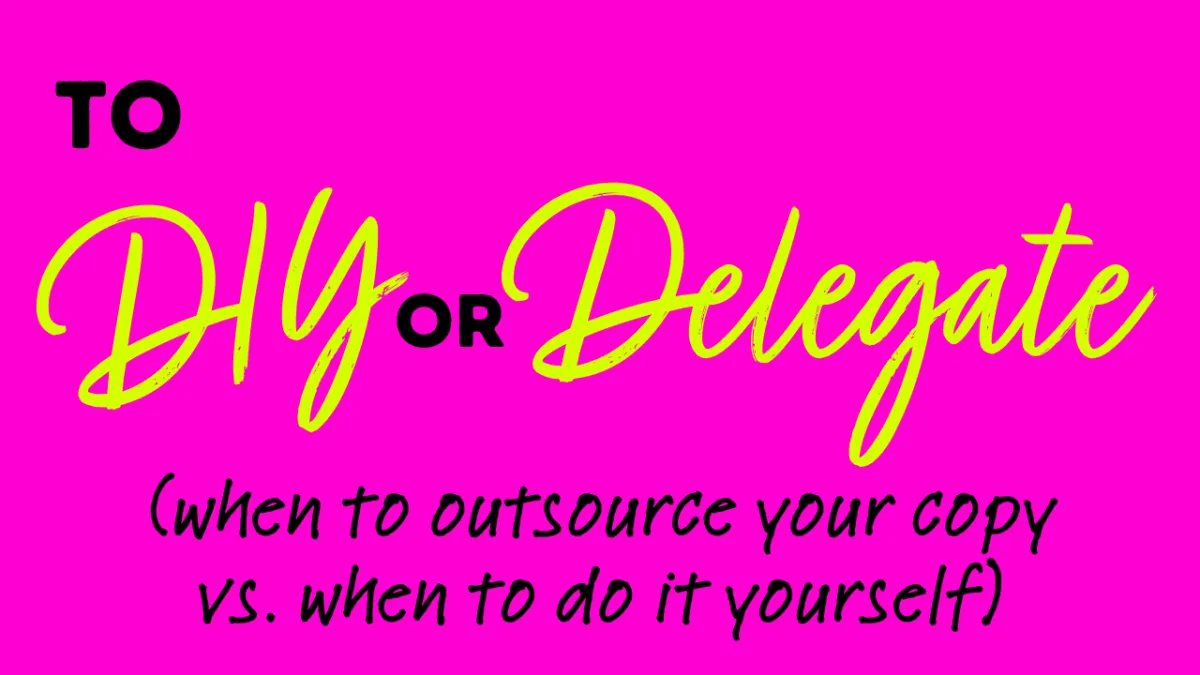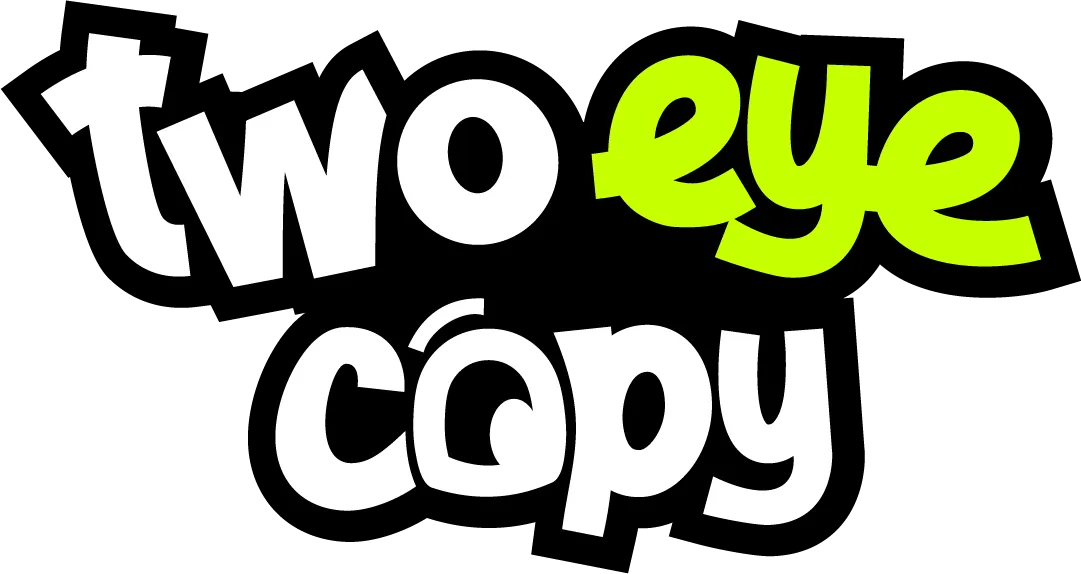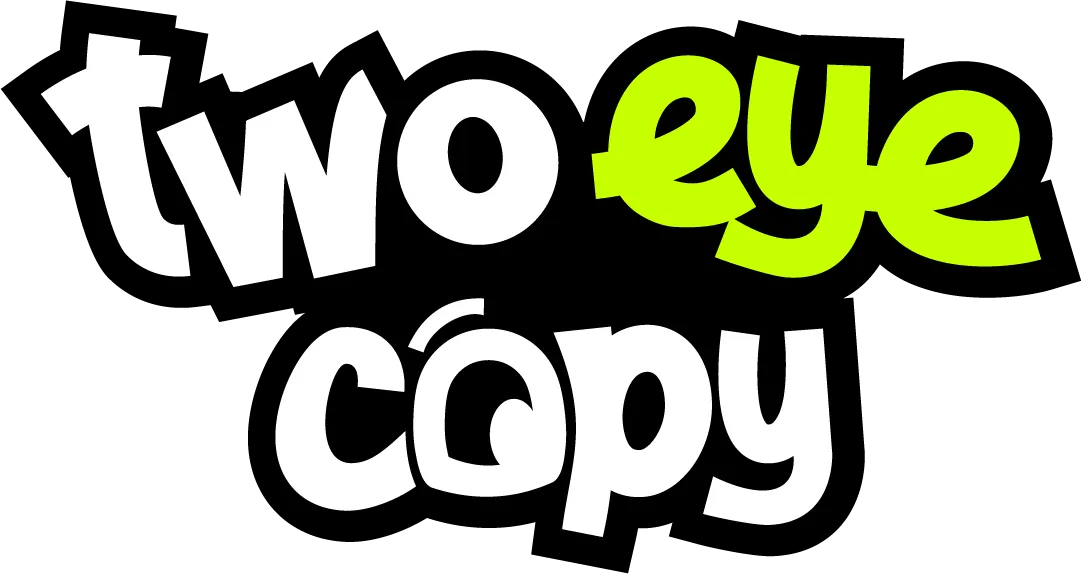
The Truth About Writing Your Own Business Copy: When to DIY and When to Delegate
You know your business best, so you should write your own copy — right?
When you’re a solo entrepreneur, wearing all the hats can feel as natural as breathing. You’re not just the visionary; you’re the strategist, the marketer, and often (especially in the beginning) the one writing customer-facing content. And it makes sense: it's your business and you know your it better than anyone. Who could possibly write about it better than you?
Turns out though, sometimes you can actually be your own worst enemy when it comes to marketing your business. Let's explore some of those scenarios and seee when it makes sense to DIY and when to delegate to a copywriting pro.
The Entrepreneurial Myth: "I know my business best, so I should write all my copy."
Yes, you are the heartbeat of your business. You know your services and products inside out, understand your industry, and speak the language of your brand. You started this business with a clear vision and mission, and only you have all that insider knowledge.
It’s easy to assume that with all this context, writing your own copy should be second nature. After all, you know what you want to say, and you know your customers …
But here's where it gets super tricky. While this expertise and passion you have is massively important —after all, the business couldn't run without you — it can also cloud the clarity and customer focus that great copy needs.
The Truth: A copywriter offers fresh perspective and expertise that turns your blah blah blah into ta-da!
Your business is your baby, letting go is hard. And when you're trying to land your first clients, you're trying to maximize every last dollar. But here's what you maybe don't realize...
1. An outside copywriter can pinpoint what truly resonates with your audience.
As the expert, it’s easy to get trapped in the details you think are essential—features, specifications, the technical side of your offerings. But that’s not always what matters most to your audience. A professional copywriter comes in with a bird’s-eye view, able to see your business through a potential customer’s eyes. This outsider’s perspective is critical in identifying the parts of your message that resonate most deeply with your audience.
When you’re as close to something as you are to your business, it’s hard to see the forest for the trees. Copywriters understand the broader context of what will pull your audience in, and can shift the focus to emphasize what matters most to them—which may be wildly different to what matters to you. You know what they NEED, but not necessarily what they WANT.
People, emotional creatures that they are, buy what they want rather than what they need.
2. Copywriters are trained in conversion techniques that you won’t find on Google.
Copywriters aren’t just wordsmiths; we're specialists trained in persuasive techniques that go beyond clever, catchy phrases. Techniques like AIDA (Attention, Interest, Desire, Action), PAS (Problem, Agitation, Solution), or the Storybrand Framework are powerful because they’re proven to work. They’re designed to pull your readers through a specific journey, building a connection and trust that leads to action—whether that’s signing up for your newsletter, joining a webinar, or making a purchase.
A pro copywriter knows exactly how to guide a reader from mild interest to the the pull of “OMG I must have this!” They can take that complicated idea you’ve been wrestling with and turn it into a clear, persuasive message that makes people convert (follow, engage, subscribe, and buy) without a second thought. And they do this by crafting a seamless experience that builds connection at every touchpoint.
So while you can find the copywriting frameworks on Google, unless you spend time studying, practicing, and implementing the actual techniques involved, they're not going to do you any good. Which leads to the next point.
3. Your time is best spent elswhere.
Copywriting is an art and a science and, like any skill, it takes practice and focus to master. If you’re spending hours agonizing over your copy, revising, and tweaking to get it “just right,” that’s precious time that could be spent doing the things that need your golden touch—whether that’s strategizing or serving your customers.
A copywriter takes that weight off your shoulders, frees up time and energy for the areas where you can have the most impact. Think of it like this: You’re the chef and the copywriter is your menu-writer. You perfect the recipe, and they write it up in the most appetizing way possible.
4. A seasoned copywriter can speak to different stages of the customer journey.
Not all customers are at the same stage in their journey with you. Some are only just discovering your brand, while others are considering making a purchase. A good copywriters is trained to write for every stage and knows the difference between awareness, consideration, and decision copy.
A first-time visitor to your website needs different information than a repeat customer reading your emails. A copywriter can create content that meets each customer exactly where they are, building trust and familiarity over time.
5. A fresh voice can reinvigorate your brand.
Sometimes, our own voice as business owners can start to feel repetitive or stale, especially if we’re writing all our content ourselves. A skilled copywriter not only brings in fresh perspective but can also breathe new life into your brand’s voice, bringing out angles and approaches you might not have considered.
The DIY vs Delegation Conundrum
Should you outsource ALL your copy though? Not necessarily. If you like writing content, absolutely keep doing it, but be strategic. Let's dive into what makes sense to DIY and what's better delegated.
When DIY Makes Sense: Playing to Your Strengths as the Expert
1. You’re writing highly personal content
Examples: founder stories, blog updates, or personal reflections that showcase your journey.
Why DIY? When the purpose of the copy is to connect on a deeply personal level with your audience, your authentic voice is the key ingredient. Customers love hearing directly from founders about the highs and lows of building a business, especially for small brands that rely on authenticity. Writing these pieces yourself ensures the tone is genuine, resonating with readers who are following your story.
2. You’re working on short-form content for social media
Examples: Instagram captions, LinkedIn updates, Facebook posts.
Why DIY? For platforms like social media, your personality and day-to-day insights are what engage your audience. These shorter pieces often don’t need the same level of strategy as a sales page or ad copy. Writing them yourself can save time and give followers an ongoing connection with you. Don't take this to mean they don't need to be strategic though – everything should fit within your marketing playbook and be unequivocally on-brand.
3. You’re testing ideas and getting direct feedback
Examples: Early-stage product descriptions, survey emails, or short website copy drafts.
Why DIY? When you’re just getting a feel for what resonates with your audience, you can often handle the initial stages yourself. You can test messaging, make quick tweaks based on direct feedback, and refine your understanding of what people respond to before passing a more developed concept to a professional. (If this sounds too complex though, you can have a copywriter guide you through the process and help you analyze the results.)
When to Delegate: Letting a Pro Take Your Copy to the Next Level
1. You’re developing conversion-focused content
Examples: Sales pages, landing pages, ad copy, email sequences.
Why delegate? Conversion copywriting is a specialized skill that goes beyond just writing well; it’s about using psychological triggers, storytelling frameworks, and persuasive language to guide readers toward a specific action. A trained copywriter knows how to make each word count, strategically moving readers closer to clicking, subscribing, or buying. If you’re investing in paid ads or a marketing funnel, it’s wise to hand this work to someone who can maximize your ROI. Note: look for a copywriter who understands SEO and/or collaborates with an SEO specialist. Because if you want your content (your site, your landing pages, your social posts) to get found, it needs to be SEO and human-friendly.
2. You’re ready for a website overhaul
Examples: Homepage copy, service pages, about page.
Why delegate? Your website is often the first impression for potential clients, so it needs to make a strong and lasting impact. Professional copywriters know how to design a message hierarchy, incorporate SEO, and tell a compelling story about your brand. They can identify which details of your business are most likely to resonate and, more importantly, lead to conversions. If your website traffic is high but conversions are low, it’s time to let a pro work their magic.
3. Your brand voice needs clarity and consistency
Examples: Brand messaging guide, tagline, high-stakes marketing content.
Why Delegate? As your business grows, the need for a clear, consistent brand voice becomes more essential. A copywriter with expertise in brand messaging can help you clarify your voice, create tone guidelines, and establish core messaging that resonates across every piece of content. This consistency builds brand recognition and trust—two elements that lead to loyal customers.
Hybrid Approach: When to DIY and Delegate Collaboratively
Sometimes, a mix of DIY and delegation can be the best approach. Here’s how to make that collaboration smooth and successful:
1. Kickstart with DIY, then pass the baton
When It Works: If you have a unique perspective on your customer’s needs but aren’t sure how to word it, write down your ideas or a rough draft and pass it to a professional for polishing. They can refine your words into a compelling, customer-focused message that still feels like you.
2. Provide a framework for a copywriter to build on
When it works: If you have a clear idea of the message but not the structure, work collaboratively with a copywriter by sharing a framework of what you want to say. A professional can then expand on it, structuring the copy in a way that resonates with readers and feels professional.
3. Bring in a copywriter for final edits and optimization
When It Works: For longer or complex pieces like case studies, eBooks, or key web pages, you might write the initial content and have a copywriter optimize it. This hybrid approach saves you time and gives you the expertise you need to make the content clear and impactful.
TL;DR
Hiring a copywriter isn’t about giving up control; it’s about supercharging your message with clarity, strategy, and results. Making sure every word counts, inspiring your audience to take action, and giving you back time to focus on the parts of your business only you can do.
So, if you’ve been holding tight to the belief that you’re the only one who can (or should) write for your brand, consider the power of partnering with a specialist. Together, you’re not just creating words on a page—you’re building bridges to your audience, one well-crafted message at a time.
Knowing When to DIY and When to Delegate is an Investment in Your Business
Learning when to DIY and when to delegate isn’t just about saving time; it’s about making the best possible impression with your audience. While you’re the expert on your business, a copywriter is an expert in crafting persuasive, polished messages that draw people in.
If you’re on the fence, consider what each piece of content is meant to achieve.
For high-impact copy that drives sales and builds trust, delegation is your best investment.
For personal reflections and social media updates, DIY to keep your own voice front and center.
Remember, just because you can write your own copy doesn’t mean you always should. Embracing the strengths of a professional copywriter is one of the smartest moves you can make as a solo entrepreneur.

Marketing not really landing? Hopefully some of these posts will help you zhuzh things up!
The Two Eye Copy blog explores how messaging, psychology, and structure connect and drive your buyers' decisions. Here you’ll find insights on copywriting frameworks, DiSC-aligned messaging, email marketing, brand identity, and marketing funnels.
If your content feels disconnected, your emails underperform, or your funnel looks fine but doesn’t convert, these posts help you understand what’s happening and how to fix it.
For more hands-on guidance, join us in Skool!
Grow your email list with integrity (and a juicy lead magnet!)
Grab this free 5-day mini course today!!


